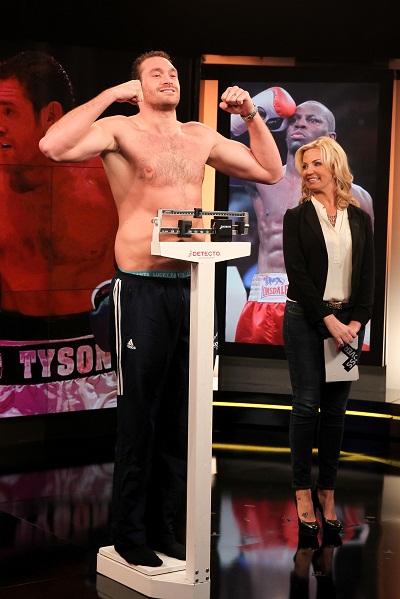Who Are These Guys? Heavyweights still a puzzle
By Norm Frauenheim–

It’s hard to now what to make of the heavyweights anymore.
Sometimes, they look as if they’re nearly extinct, vanishing faster than starving polar bears in the melting arctic. Sometimes, they appear to be a symbolic corner of nostalgia, gone from the here-and-now and consigned to the black-and-white clips relevant only to the documentary filmmaker.
Then, there are days when they just look like a crazy collection of wackos. Throw a net over all of them. Tyson Fury showed up at a news conference Wednesday in London for his October 24 bout with Wladimir Klitschko in a Batman costume. Fury, who often behaves as if he’s a better fit for a strait jacket, leaped over a table to tackle some joker dressed as The Joker. The grown-up in the room, the ever-sober Klitschko, looked as if he didn’t know whether to laugh or cry.
“Sometimes, I wonder what’s going on with these guys,’’ said Klitschko, a PhD who a day later diagnosed Fury as a bipolar psycho-path. “It’s weird.’’
Yeah, it sure is.
The heavyweight division has been in a state of crisis ever since Mike Tyson, the real fury, was diagnosed as bipolar. Tyson is happy and sane these days. He’s a voice of reason. But the heavyweights continue to be a cartoon show. At their best, they are the Euro League, ruled from Moscow to London by Klitschko.
A pound-for-pound debate in the wake of Floyd Mayweather Jr.’s announced retirement reflects the confusion about whether heavyweights are relevant anywhere, anymore
Flyweight Roman Gonzalez is No. 1 in the latest pound-for-pound ratings published by The Ring and ESPN. Meanwhile, The Ring ranks Klitschko No. 6. ESPN has him at No. 8. There’s a pretty good argument that, at the very least, he deserves to be among the top five.
After all, he hasn’t lost since April, 2004 to Lamon Brewster. He has defended the title 18 successive times. But he’s been at the top of the division for so long that his dominance is judged by the quality of his opposition and time. Like a longtime politician in the polls, he is losing votes in both categories.
For more than a decade, his opponents have had virtually no chance against his size, jab and unerring implementation of tactical skill. They’ve been the jokers. Not him. But without a real challenge over such a long stretch, there’s a parallel erosion in respect for him. Then, there’s his age, perhaps a bigger issue. He’s 39. From round to round, the critics are looking for what opponents can’t find. Have his reflexes begun to betray him?
Maybe, Fury will discover that they have, although the guess here is that his emotions will distract him and leave him open to a succession of fight-ending combinations from a patient and poised Klitschko.
Then, there’s the Deontay Wilder possibility. Wilder (34-0, 33 KOs), who faces unknown Frenchman Johann Duhaupas (32-2, 20 KOs) Saturday in Birmingham on NBC (8:30 pm ET/5:30 pm PT) is the latest in a long string of Great American Hopes.
Wilder, of Tuscaloosa, Ala., has the WBC piece of the title. He likes to talk and brings some charisma to the cameras and the ring. There’s a lot to like. The temptation is to say that Wilder will help restore relevance, credibility and some sanity to the old heavyweight edifice. But Wilder’s relative inexperience is reason to be cautious about whether he in fact is ready for Klitschko or even Alexander Povetkin, perhaps next year.
“The heavyweights are definitely coming back,’’ Wilder said in a conference call. “I’m just excited to be a part of it. Not only just me, but we have a lot of other guys in the heavyweight division.
“…Our time has come around and it’s very important because everybody always dwells on the past and back-in-the-day. They can’t get past back-in-the-day. Today is a new day. It’s a new era of boxing, it’s a new era of heavyweights and they have to get comfortable with what’s going on in your generation, you know?
“Past generations, that was the past. You have to move forward.’’
And beyond The Jokers.